

Why Are the Chinese Buying Record Quantities of Gold? China investors set their sights on Hollywood. You won’t believe who owes U.S. billions. Text smaller Text bigger How would it be if the next few hundred billion dollars or so in U.S. bills could be paid off in cash?
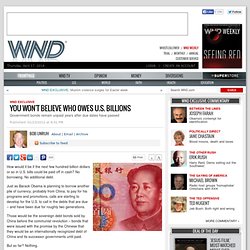
No borrowing. No additional debt. Just as Barack Obama is planning to borrow another pile of currency, probably from China, to pay for his programs and promotions, calls are starting to develop for the U.S. to call in the debts that are due – and have been due for roughly two generations. S premier mining and mining investment website Are China`s gold imports reaching panic proportions? - INDEPENDENT VIEWPOINT.
China's latest gold figures showing record imports through Hong Kong look unrelentingly bullish.
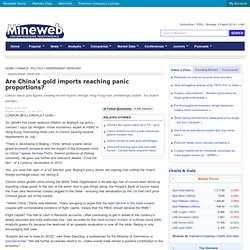
Too bullish perhaps... Author: Adrian Ash Posted: Thursday , 12 Jan 2012 LONDON (BullionVault.com) - How will China's Pan Asian Gold Exchange Revolutionize Gold and Silver Trading? Commodities / Gold and Silver 2012Jan 18, 2012 - 02:45 AM GMT By: Sam_Chee_Kong PAGE which stands for Pan Asian Gold Exchange was set up in 2011 and has already begun operations with local Chinese buying and selling of gold through the internet.
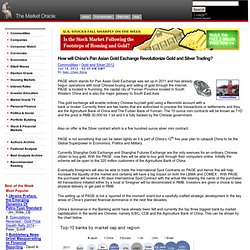
PAGE is located in Kunming, the capital city of Yunnan Province located in South Western China and is also the major gateway to South East Asia. This gold exchange will enable ordinary Chinese buy/sell gold using a Renminbi account with a bank or broker. Chinese Gold Sales Up 49.7% In The First Week Of The Year Of The Dragon. Mass employment in manufacturing just isn't coming back. It's a consitent trope from those over on the mouth breathing left, that everything would just be better if we did more manufacturing in the UK.
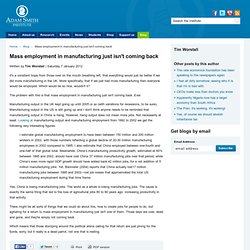
More specifically, that if we just had more manufacturing then everyone would be employed. Which would be so nice, wouldn't it? The problem with this is that mass employment in manufacturing just isn't coming back. Ever. Foxconn Is Still a Hard Place to Work. As American consumers ogle over shiny new gadgets at this week's Consumer Electronic's Show, the workers that make those products are threatening mass suicide for the horrid working conditions at Foxconn. 300 employees who worked making the Xbox 360 stood at the edge of the factory building, about to jump, after their boss reneged on promised compensation, reports English news site Want China Times.

It's not like this is the first time working conditions at Foxconn have made news outside China. But iPhone and Xbox sales surely haven't lagged in the wake of those revelations and neither Apple nor Microsoft has done much of anything to fix things. Apple, America and a Squeezed Middle Class. But as of spoke, interrupted with an inquiry of his own: what would it take to make iPhones in the United States?
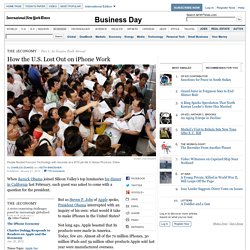
Not long ago, Apple boasted that its products were made in America. Today, few are. Almost all of the 70 million iPhones, 30 million iPads and 59 million other products Apple sold last year were manufactured overseas. Why can’t that work come home? Mr. Mr. The president’s question touched upon a central conviction at Apple. Apple has become one of the best-known, most admired and most imitated companies on earth, in part through an unrelenting mastery of global operations. However, what has vexed Mr. Apple employs 43,000 people in the United States and 20,000 overseas, a small fraction of the over 400,000 American workers at General Motors in the 1950s, or the hundreds of thousands at General Electric in the 1980s. Hong Kong air pollution at worst levels ever: report. Economics focus: How to get a date. New Asian Union Means The Fall Of The Dollar.
One of the most frustrating issues to haunt the halls of alternative economic analysis is the threat of misrepresentative terminology.
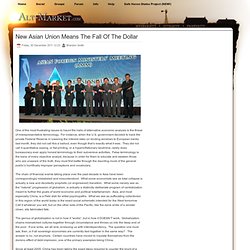
For instance, when the U.S. government decided to back the private Federal Reserve in lowering the interest rates on lending windows to European banks last month, they did not call this a bailout, even though that’s exactly what it was. They did not call it quantitative easing, or fiat printing, or a hyperinflationary landmine; rarely does bureaucracy ever apply honest terminology to their subversive activities. False terminology is the bane of every objective analyst, because in order for them to educate and awaken those who are unaware of the truth, they must first battle through the daunting muck of the general public’s horrifically improper perceptions and vocabulary.
The chain of financial events taking place over the past decade in Asia have been correspondingly mislabeled and misunderstood. Saudi, Chinese oil giants ink joint refinery deal. Obama’s Keystone Denial Prompts Canada to Look to China Sales. President Barack Obama’s decision yesterday to reject a permit for TransCanada Corp.’s Keystone XL oil pipeline may prompt Canada to turn to China for oil exports.
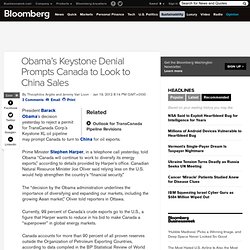
Prime Minister Stephen Harper, in a telephone call yesterday, told Obama “Canada will continue to work to diversify its energy exports,” according to details provided by Harper’s office. Canadian Natural Resource Minister Joe Oliver said relying less on the U.S. would help strengthen the country’s “financial security.” The “decision by the Obama administration underlines the importance of diversifying and expanding our markets, including the growing Asian market,” Oliver told reporters in Ottawa. Currently, 99 percent of Canada’s crude exports go to the U.S., a figure that Harper wants to reduce in his bid to make Canada a “superpower” in global energy markets.
Local View: China wants to call shots on Canadian oil. Americans view China's competition in telecommunications and fiber optics as worrisome enough that policymakers regularly consider enacting protectionist legislation.
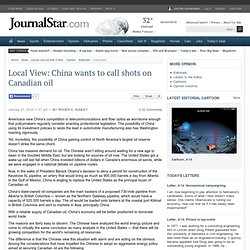
The possibility of China using its investment policies to seize the lead in automobile manufacturing also has Washington reacting vigorously. Yet, incredibly, the possibility of China gaining control of North America's largest oil reserve doesn't strike the same chord. China gets jump on U.S. for Brazil's oil. BUENOS AIRES — Off the coast of Rio de Janeiro — below a mile of water and two miles of shifting rock, sand and salt — is an ultradeep sea of oil that could turn Brazil into the world’s fourth-largest oil producer, behind Russia, Saudi Arabia and the United States.
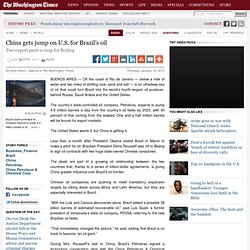
The country’s state-controlled oil company, Petrobras, expects to pump 4.9 million barrels a day from the country’s oil fields by 2020, with 40 percent of that coming from the seabed. One and a half million barrels will be bound for export markets. The United States wants it, but China is getting it. Less than a month after President Obama visited Brazil in March to make a pitch for oil, Brazilian President Dilma Rousseff was off to Beijing to sign oil contracts with two huge state-owned Chinese companies.
GM deal moves electric car development to China. Updated 2011-09-20 2:39 PM A Chevrolet Volt at the China Pavilion at Expo 2010 in Shanghai. It was the first working Volt prototype in China. Sales of exported Volts are set to begin in China by year-end. China’s very mysterious data. A quick observation. I could not help noticing that China’s imports from Japan fell 16.2pc in December. Imports from Taiwan fell 6.2pc. China paper says punish Philippines over US ties.